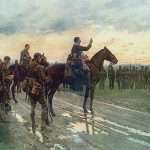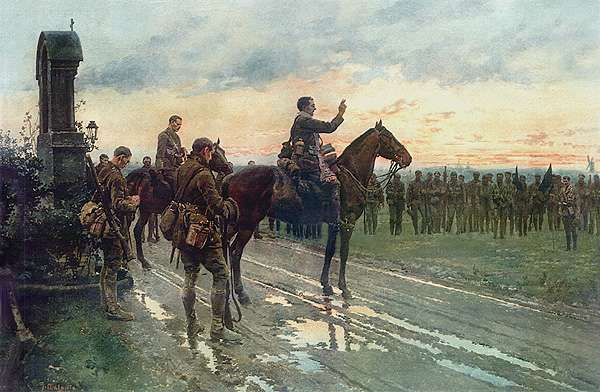Seeking blessings
Walking out of the hospital door and turning for the car park, a voice called out, ‘Father, Father, have you a minute?’ Turning towards the voice, a man in his 30s stood with a woman of a similar age, an older man, and a boy of maybe six or seven years of age. ‘Father, my son was attacked by a dog, would you give him a blessing?’
The boy looked frightened, a line of stitches ran over the top of his head, visible through his short hair; the attack had been serious. The English rationalist in me wanted to suggest that the boy had been through a bad experience and they should be hurrying home, but they stood and stared earnestly. ‘I’m Church of Ireland’, I said, wanting to make it clear that I would probably not have the form of words for which they were searching.
‘That’s all right’, the man replied,’ ‘we just wanted a blessing’.
I crouched down and said the words of the standard Anglican blessing and, assuming they would want some outward gesture, traced the sign of the cross on the boy’s forehead. He looked pale and tired.
The man and then the woman and then the older man, who was the grandfather, each stepped forward and shook hands. To an onlooker the moment must have looked very odd, yet the sincerity of their response made it clear that the moment had been important for them.
In a discussion of yesterday of remembrance, my colleague in Abbeyleix, Co Laois had talked of the poignancy of a painting of a moment on the Western Front when a priest on horseback had given an absolution to soldiers about to go into battle. This evening he sent a link to the painting; the notes with it say:
On Saturday evening the 8th May 1915, prior to the battle in the Aubers Ridge area, the 2nd Battalion Royal Munster Fusiliers marched through Rue du Bois, about one mile out from the town of Neuve Chapelle in Belgium. The Battalion halted near a wayside shrine. Moving off the road they formed up in their respective Companies, ‘A’, ‘B’, ‘C’ and ‘D’. In front of each Company was a green flag with the Irish Harp and word “Munster” embroidered on it.
Father Francis Gleeson on horseback, facing ‘A’ Company troops and wearing his stole, administered to them a ‘General Absolution’.
The scene was captured by the famous war illustrator Fortunina Matania, who came from Naples.
On the following day, 9th May 1915, 22 officers and 520 soldiers went into battle. Only 3 officers and 200 soldiers survived.
What went on in the minds of the Munstermen standing there on that May Saturday? Was the blessing sought for them or something they sought? The cynic in me would yesterday have argued that they stood there under orders; after this afternoon’s experience, perhaps they stood with heads bowed of their own volition.



My uncle probably gave the last rites to dying soldiers who were not of the Protestant faith during his tenure as chaplain in the British Army – I am sure those soldiers their families were grateful for the words of comfort they received rather than worrying about my uncle’s religious leanings.
In Aut Even recently our daughter Anna was having a small operation and her consultant, a lovely man, was looking through her notes pre-op and said “I see you are one of us” which stumped me for a bit until I realised he meant that we were C of I like him. He went on to say that he doesnt understand why its important to list the patient’s religion on their admission to a hospital – I agreed but said that perhaps its to help the hospital Chaplains to determine which of the patients they should be visiting though it shouldnt really matter as we are all going the “same way” anyway though some would beg to differ. Twice when in hospital I was visited by lovely priests who assumed I was one of their flock – they even blessed me which, as my mother used to say, didnt do me one bit of harm !!.
I think integrity is what matters – I wouldn’t wish someone to assume that I was something I was not.
The Papal position is that Anglican orders are not valid and that we lack what it requires to be a true church. Of course, I don’t accept what he says, but the people were obviously devout in their own faith and it was important to respect their sensitivities.
How wonderful that you were there at that moment for them. Knowing you, Ian, and the words you would have said nothing in this world could have been more meaningful or sincere. I am sure that family were very comforted in their time of need.
I think an appearance of sincerity probably concealed an inner sense of bemusement.
Sometimes you can do something to help – and it’s good to do.
Not so sure about the painting above though – good to look at it – but never been comfortable with the idea of blanket absolution for what you’re about to do. If it has to be done, then do it. But don’t pretend it’s something it’s not.
Reminds me of one of Michael Collins’s hit squad who assassinated the British Cairo Gang in Dublin. One of Collins’s men recounts how he went first to confession and then to where his target was – “…and then I plugged ‘im.”
‘Then I plugged him’ was the sort of account of history so despised by the history lecturer in an earlier post whose notes resembled a fish and chip wrapper!